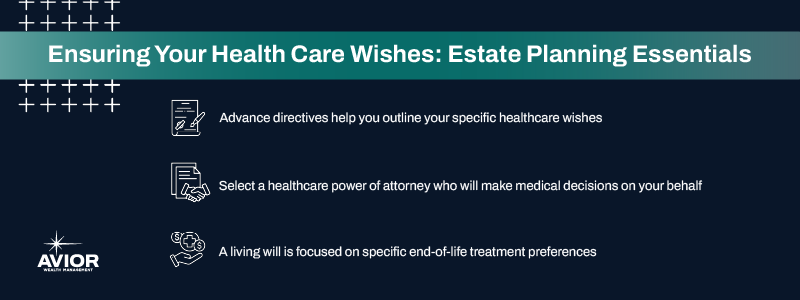Ensuring Your Health Care Wishes: Estate Planning Essentials
Creating advance directives, including a living will and a medical power of attorney, will ensure your healthcare preferences are followed later in life.

Estate planning comprises several different areas, from estate taxes to legal documents to trusts and wills. However, one important area you can’t ignore is healthcare.
You never know what the future will bring as far as medical needs and associated costs. Preparing now will make it easier for you and your family members when you need additional care. Another reason to prioritize healthcare planning is to ensure your health-related wishes are carefully followed.
So, how can you ensure your wishes are protected? This guide walks through best practices for incorporating your health preferences into your estate plan.
Choosing a healthcare power of attorney
First, appoint a healthcare power of attorney. This should be someone you trust to make decisions on your behalf should you become incapacitated.
A healthcare power of attorney is an important legal document that allows you to appoint a loved one to take over your medical decisions when you’re unable to make them. This could be decisions regarding when to seek care, medications, the institutions you go to, and preferences for end-of-life care.
Think through who would be best for this responsibility. Who in your life is most familiar with your health and medical care? Who can you trust to follow your wishes carefully? Who is most reliable and responsible?
Your power of attorney may have a significant role in your future. It’s not a decision to be made lightly, so consider working with a legal or financial professional when making this choice and drafting the document.
Documenting your health wishes with an advance directive
A power of attorney is one type of advance directive. While both legal documents are important in advanced care planning and addressing healthcare decisions, they serve different purposes.
An advance directive outlines your preferences for medical treatment in the event you can’t communicate or make decisions. It may include instructions about life-sustaining treatments, organ donation, and other healthcare preferences. An advance directive provides specific instructions, whereas a medical power of attorney grants decision-making authority to another person.
Without these healthcare preferences in writing, your family members may not know how to make difficult choices for you later on. Take plenty of time to consider what you want your care to look like and what decisions you would make in certain scenarios, which may be hard to think about. A legal professional can help you draft language that reflects your wishes to minimize ambiguity.
The role of a living will in estate planning
Another type of advance directive is a living will. This document focuses on specific preferences for medical treatments in case you become incapacitated and can’t communicate.
A living will outlines the medical interventions or life-sustaining treatments that you wish to receive or avoid in certain situations, such as terminal illness or irreversible coma. It provides guidance to healthcare professionals and family members about your desires regarding issues like resuscitation, mechanical ventilation, or artificial nutrition.
Communicating with family members and healthcare providers
Even with the right legal documents in place, it’s crucial to discuss your wishes and concerns with the people around you. Bring your loved ones into the conversation so they know your preferences and can effectively honor them. Talk to your trusted healthcare providers as well, and keep them in the loop as you create estate planning documents.
These conversations aren’t always easy. Make sure you’ve made up your mind before you sit down to talk to family members. Be clear and direct but keep communication open both ways. It may help to explain your reasoning behind certain decisions. Let loved ones know about the documents you created and where to find them.
Legal requirements and accessibility
Estate planning laws vary by location, so research what’s required in your jurisdiction. Certain elements need to be included in healthcare planning documents if you do decide to create them.
First, you must have the capacity to create these documents, meaning you must be of sound mind and understand the nature and consequences of your decisions. The documents should be executed voluntarily and knowingly without influence or coercion.
Advance directives also require your signature and may need to be witnessed or notarized to be legally valid. The witnesses, in some jurisdictions, need to be disinterested parties, meaning they are not beneficiaries or involved in the healthcare system.
Including all formalities and meeting legal requirements are crucial for your health-related estate planning documents to be enforceable and valid. Consult with legal professionals that are familiar with local laws to ensure your documents effectively convey your wishes and comply with the law. Regular reviews and updates may be necessary to reflect health status, preferences, or family changes.
Finally, make sure your documents are stored securely but remain accessible to those who need them. Give relevant parties, like healthcare providers, copies so they have your wishes on file. Ensure that your loved ones know how to access any safe or filing cabinet where your documents are stored.
Creating legal documents for healthcare planning
Considering your health wishes for the future is key in estate planning. It’s wise to create advance directives, including a living will and a medical power of attorney, so your preferences and designations are in writing. You can then rest assured that your wishes are followed if you are unable to make medical decisions.
These are complicated matters but you don’t have to manage them alone. Seek professional advice from the advisors at Avior. We tailor our estate and healthcare planning solutions to you so you have the right comprehensive financial strategy.
Contact Avior today to learn more about our wealth management services.
Disclaimer: Nothing contained herein should be construed as legal or tax advice. Avior and our Advisors will work with your attorney and/or tax professional to assist with your legal and tax strategies. Please consult your attorney or tax professional with specific legal and/or tax questions. Investment Management and Financial Planner are offered through Avior Wealth Management, LLC, an SEC-registered investment advisor. Past performance is not a guarantee of future results. Investments are subject to loss, including the loss of principal.
No Comments
Sorry, the comment form is closed at this time.




